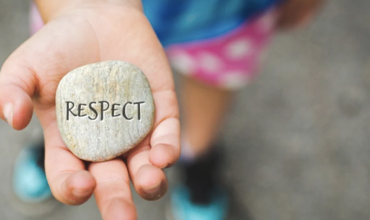Q. We have young children ages 3 and 5. My wife and I want to raise them to be respectful. We’ve observed disrespectful kids running in restaurants, kicking the seats in front of them on airplanes and even calling their parents names. It seems kids are less considerate today than in past generations. What suggestions can you offer for raising respectful children?
A. You say it seems kids are more disrespectful today than in the past. While I see some families raising polite children, I also see disrespectful behaviors coming from not only children but adults as well. Some pediatricians report seeing more rude behavior between family members. Some folks writing about disrespect also point to our children getting praised for minor efforts as part of the problem. Children see they can get by with many things, including disrespectful behavior.
In an essay, “Advanced in Years,” Frank Bures describes the work of David Lancy, an anthropologist and author of Raising Children: Surprising Insights From Other Cultures. Lancy explains that as a nation we focus on our children and consider them our most valued members of society. This is unlike much of the world where elders are the most valued members. Children in an elder-focused society learn to earn their way into importance by helping their elders and community. In our society, it seems that most children aren’t taught this level of respect.
Regardless of the reasons we have perhaps become more disrespectful as a society, you asked for advice on how to raise respectful children. Here are some suggestions:
- When a child demands that something be given to him, rephrase it in a calm voice. If a child says, “I want a cookie now,” a parent can suggest, “Could I please have a cookie?”
- Model what you want to see from your child. Use “please” and “thank you” with your child. Speak respectfully of others and avoid talking negatively about anyone in person or on social media.
- Look for the reason behind a child’s disrespectful words such as “I hate you” or “you are a bad mom or dad.” Most often he is expressing anger about something else. Help a child learn to recognize his anger so he can say, “I’m angry” rather than name calling or saying something hurtful that he really doesn’t mean.
- Teach children empathy for others. Talk about what it would be like to be in another person’s shoes, especially someone who is being bullied, called names, chosen last for teams or excluded from groups.
- Set family rules that enhance respect. One rule might be to put the cell phones and other social devices away at meal time.
- Take away privileges when you tell a child to stop a behavior and she won’t stop.
- Teach children to treat others like they want to be treated.
- Take your children places where they will interact with people who are respectful and can be respectful in return.
- Listen to your children and respect their choices. This teaches them to do the same when interacting with others.
- Encourage them to engage in conversations using the mantra, “If it’s not kind, don’t say it.”
You are to be commended for wanting to raise kids who are respectful. If more and more parents do this, we will see more respectful behavior in this country as a whole.
Betty Richardson, PhD, RN, CS, LPC, LMFT, is an Austin-based psychotherapist.


















